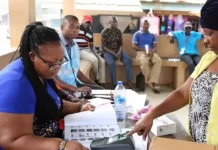
For over two decades the Government of Ghana has initiated a number of policies and programmes geared towards facilitating the poor’s access to varied social services. The National Health Insurance Scheme is one of such pro poor development initiatives.
As a pro poor government intervention, the NHIS is expected to facilitate the poor’s access to healthcare by removing financial barriers that hitherto had affected the health seeking behaviour and status of citizens—especially among vulnerable groups and the poor.
However, the question that is lingering on the minds of many Ghanaians is whether the majority of the poor are actually covered by the scheme?
A SEND-GHANA report which seeks to assess the ‘pro poorness’ of the NHIS by ascertaining the extent to which the poor and other vulnerable groups are using the Scheme as a vehicle for accessing healthcare services revealed that by 2012 the membership of the scheme stood at 35.5 % of the Ghanaian population.
A little over half (51.2%) of the insured were children under 18 years; followed by persons in the informal sector (35.5 %). Other categories such as older people aged 70 years and above (4.5 %), Social Security & National Insurance Trust (SSNIT) contributors/pensioners (4.5 %) and indigents (4.4%) together constituted 13 %.
However, the total membership of the NHIS showed that the scheme has failed to attain universal coverage as envisaged by the Act; which would have ensured that the poor in Ghana are all covered.
Even though the majority of the poor in Ghana are found in the informal sector, only 3.7 million out of the estimated 11 million informal sector operators were members of the NHIS in 2013.
This revelation brings into focus the assertion that the scheme is benefitting the rich rather than the poor.
The Public Relations Officer of the Scheme, Selorm Adonoo, agreed that the report is a reflection of what the NHIS has discovered, and said that beyond the operational challenges which include weak institutional collaboration, low institutional capacity and lack of harmony in the determination of poverty indicators, the scheme has had significant coverage. He also added that the scheme needs to deepen the collaboration with the Department of social welfare to be able to identify the poor for registration.
“Identifying the poor for registration has remained the scheme’s biggest challenge,” he bemoaned.
The scheme says it has put measures in place to make it work; therefore, it has deployed personnel to health facilities across the country as part of measures to reduce the burden of subscribers when they visit the hospital as captured by the report.
As part efforts to improve the scheme, a team from the NHIS Review Technical Committee held a meeting with management of SEND-GHANA to explore ways of enhancing quality healthcare in Ghana.
The chairman of the committee, Dr. Chris Atim, praised SEND-GHANA for conducting the NHIS research.
“SEND-GHANA has a lot to contribute in setting the priorities of NHIS because SEND-GHANA is one of the influential Civil Society Organizations in Ghana which represents the voice of the marginalized,” he added.
To ensure that the NHIS reflect its pro poorness, SEND recommended that, the Department of Social Welfare should be equipped with the necessary logistics and human resources needed to enable it perform its functions.
In addition, influential community members such as Chiefs and Assembly Members should be given the needed capacity by the Department of Social Welfare to be able to identify the poor and vulnerable in their communities for referral for registration.
Source SEND-GHANA


























